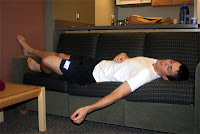
An irregular verb is a verb that doesn't change tense the way most verbs do.
Verb tense has to do with time. Are you doing it now, or did you do it in the past, or will you do it in the future?
A regular verb such as "laugh" adds "ed" when it changes to past tense.
Present Tense: I laugh now.
Past Tense: Yesterday I laughed.
Future Tense: Tomorrow I will laugh.
Some verbs show tense in other ways.
For instance,
Present Tense: I run now.
Past Tense: Yesterday I ran. (not "runned")
Lie and lay are irregular verbs. They are two different verbs meaning different things, but they often get mixed up. That is why we study them along with our 7th grade confusing words.
Lie means "to recline or rest."
Here is how you show time with the verb lie:
Present Tense: I lie on my bed now.
Past Tense: Yesterday I lay on my bed.
Future Tense: Tomorrow I will lie on my bed again.
And: I have been lying on my bed.
I have lain on my bed many times.
Lay means "to put something down or to place something somewhere." You could use "put" or "place" instead of "lay."
Here is how you show time with the verb lay:
Present Tense: I lay the baby on the bed now.
Past Tense: Yesterday I laid the baby on the bed.
Future Tense: Tomorrow I will lay the baby on the bed again.
And: I have been laying the baby on my bed every day.
I have laid that sleeping baby on my bed many times.
"Lie" is an action I do to myself, but I do the verb "lay" to something or someone else.
In English class terms, the verb "lay" takes a direct object.
________________________________
-->
Some verbs take a direct object. (Transitive) They do something to something.
need “I need money.”
hit “I hit the ball.”
kick “I kicked my brother.”
destroy “The transformer destroyed the city.
kiss “I kissed Ernestine.”
The verb “lay” takes a direct object. It is transitive.
“I carefully laid the beef roast inside the bars of the lion’s cage.”
[The forms of the verb are lay, laid, has been laying, has laid.]
Some verbs do not take a direct object. (Intransitive) They just do.
looked “I looked, but didn’t see anything.”
slept “I slept all night.”
The verb “lie” does not take a direct object. It is intransitive.
[The forms of the verb are lie, lay, has been lying, has lain.]
"I will quietly lie behind the fence until the guards have passed."
"Last night I quietly lay behind the fence until the guards had passed."
Some verbs can be either transitive or intransitive: shook, felt, read.
Intransitive
When I get frightened, I shake.
That was how I felt.
I read all night.
Transitive
Transitive
I shook the apples out of the tree.
I felt the slimy surface of the dragon's tongue.
I read the book in one night.
___________________________________________
I read the book in one night.
___________________________________________
The Irregular Verbs Lie and Lay
lie
I lie on the grass.
Yesterday I lay on the grass.
I was lying on the grass.
I have lain on the grass.
lay
I lay the book on the desk.
Yesterday I laid the book on the desk.
I was laying the book on the desk.
I have lain the book on the desk.
Some verbs are IRREGULAR (weird).
You need to know these irregular verbs: lie and lay
 |
| http://bodyweightworkout.wordpress.com/ |
lie = to recline
| past (Yesterday . . . ) |
past
participle and past perfect
using was, had, etc.
(Yesterday . . . ) | present (Now . .) |
present
participle and present perfect using
is, have been
(Now. . . ) | future (Tomorrow....) |
I
|
lay
|
was lying
had lain |
lie
|
am lying
have been lying |
will lie
|
he, she, it
|
lay
|
was lying
had lain |
lies
|
is lying
has been lying |
will lie
|
singular noun --lamp
|
lay
|
was lying
had lain |
lies
|
is lying, has been lying,
|
will lie
|
they, we
|
lay
|
were lying
had lain |
lie
|
are lying, have been lying
|
will lie
|
plural noun
lamps
|
lay
|
were lying
had lain |
lie
|
are lying
have been lying |
will lie
|
lay = to put or place
|
past
(Yesterday . . . ) |
past participle
and past perfect
using was, had etc.
(Yesterday . . . ) |
present
(Now . .) |
present participle
and present perfect
am, have been
(Now . .) |
future
(Tomorrow....) |
I
|
laid
|
was laying
had laid |
lay
|
am laying,
have been laying |
will lay
|
he, she, it
|
laid
|
was laying
had laid |
lays
|
is laying
has been laying |
will lay
|
singular noun
ape
|
laid
|
was laying
had laid |
lays
|
is laying
has been laying |
will lay
|
they, we
|
laid
|
were laying
had laid |
lay
|
are laying, have been laying
|
will lay
|
plural noun
apes |
laid
| were laying had laid |
lay
|
are laying, have been laying
|
will lay
|
